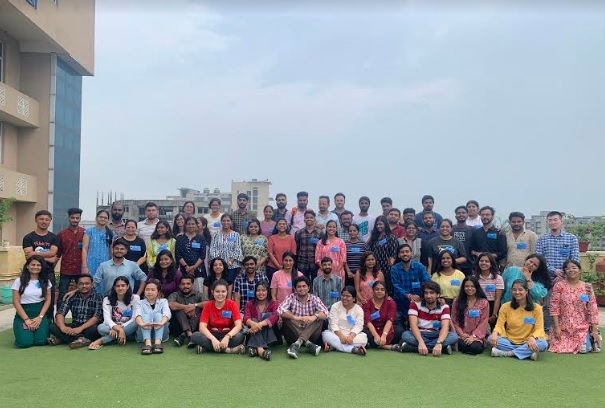Indian School of Development Management (ISDM), a pioneering organisation that is creating and strengthening the domain of Development Management, welcomed its new batch of students for the class of 2022-2023 as part of its Post Graduate Program in Development Management (PGP DM). The institute hosted its orientation session for the newest cohort of students in Noida between August 01, 2022, and August 06, 2022. ISDM shortlisted some of the brightest minds following a rigorous selection process and now has a class comprising of freshers and professionals with some experience for the 11-month program.
ISDM welcomes sixth cohort with its week-long orientation session in Noida campus
Highlights from Orientation
Students exposed to Social Entrepreneurship Experience facilitated by “Bridge4Change” & “Project Chakra”
Hands-on training to help the students realise social sector dilemmas for leaders
Students visited Chintan, a Delhi-based NGO on waste management to understand the operation & management of the organisation
Beginning with a robust welcome session, ISDM hosted prominent personalities including Prof. L S Murty, Dean, ISDM, who comes with a glorious academic background as faculty at India’s top management schools including IIM Bangalore and XLRI Jamshedpur, Mr. Gaurav Shah, Founder, ISDM, who comes with an experience of working in the private sector and the development space in key roles with P&G, and American Express, Mr. Ravi Sreedharan, the President of ISDM Management who has been part of the leadership team at HSBC and was exposed to the social sector as Head – Education Leadership and Management at a well-known India based social sector set-up, Mr. Vijay Mahajan, Co-founder & CEO at Rajiv Gandhi Foundation, and Prof. A K Shiva Kumar, Development Economist and Policy Advisor.
Speaking at the orientation program, Ravi Sreedharan, the President of the Indian School of Development Management said, “The purpose of Development Management is to achieve impact at population scale in sustainable ways. We believe that you will go on to lead Social Purpose Organisations that will benefit wide sections of society. Remember that you will learn the most from the people least like you. In the coming, year and beyond, make a conscious effort to know, listen, share, and exchange with people who are the least like you.”
The certification program offered at ISDM is widely recognised by highly reputed Social Purpose Organisations (SPOs). ISDMs alumni work with some of the leading SPOs, research organisations, and think tanks across the country and internationally.
Speaking at the session, Prof. L S Murthy, Dean of ISDM stated, “You have all decided to make a difference. ISDM will support you in every way possible in your journey ahead. The curriculum and pedagogy which you will experience here are unparalleled. Be open to receiving inputs and ideas from others even if they are at gross variance from yours. Mark where you diverge and even where you converge.”
Speaking at the event, Prof. A K Shiva Kumar, Development Economist, and Policy Advisor said, “Few NGOs or Social Purpose Organisations have been able to make an impact on scale. The need of the hour is to get the match right – between management and development. The ends of Development Management are more than enhancing managerial efficiency. Development Management needs to improve the quality of people’s lives and enhance their security and freedoms.”
Established in 2016, ISDM leads the way in creating leadership to help catalyse the impact at scale for the social sector. ISDM is a research-led institution dedicated to building an entire ecosystem for Development Management. We are taking ahead pioneering work for creating knowledge, building capacity, and nurturing the talent development sector.
About ISDM
ISDM is an institution founded to create, strengthen, and establish Development Management, a domain that transcends the exclusive silos of “development perspectives” and “management principles”. ISDM recognises the need to “professionalise” the leading and managing of Social Purpose Organisations (SPOs). The institution sees the development space as requiring the application of management disciplines that are unique and tailored to the scale of the sector. Management that doesn’t merely retrofit Business Management to development projects, but one that is born specifically from the coming together of the two crucial domains.

































